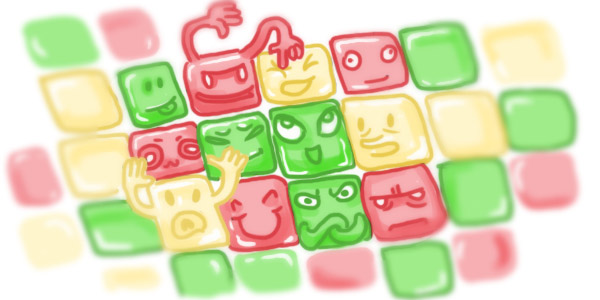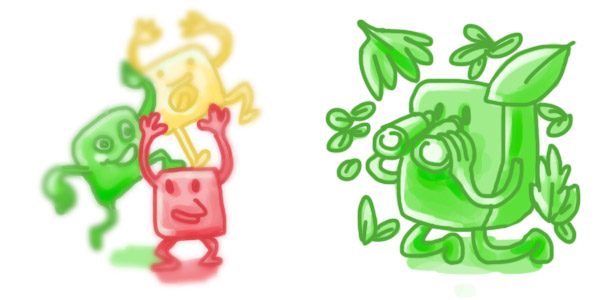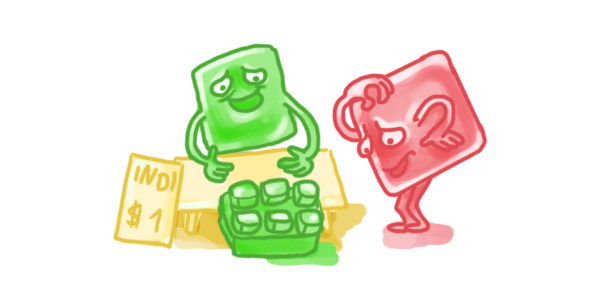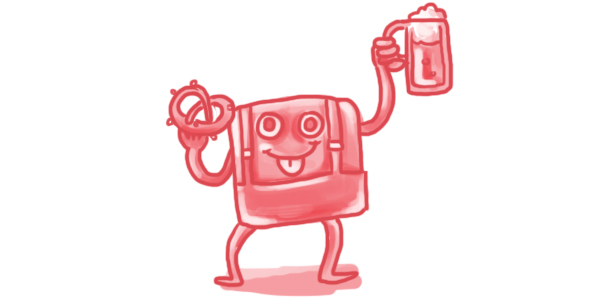
Because of the fact that most of us smaller developers face the problem of not getting enough attention I would like to take a closer look at my own country and its even more unknown indie game scene - Germany.
When it comes to games, Germany is foremost known for simulations (Demolition Simulator by Giants Software), engines (Cry Engine by Crytek) and board games (The Settlers of Catan by Klaus Teuber). In fact, we seem to consume more video games then we actually produce or sell outside of Germany.
Besides Crysis 1, 2 and 3, have you ever heard of the building game series Anno by Related Design, The Settlers series by Blue Byte, the beloved adventures from Daedalic Entertainment like Deponia or the RPG series Gothic and Risen by Piranha Bytes?
If none of the mentioned titles - which are known by every German interested in games - rings a bell you might get an idea of what kind of problems the German indie game scene must be facing. The purpose of this article is to introduce some of their specimen, to define some typical German qualities and their problems.

Education in Germany
To start with the German indie scene means to begin with the Indies' education and where they come from.
There are several possibilities to start your path to the German game industry. I suppose in most European countries and the U.S. it's also like this: you can study computer science to be a programmer or design to be an artist.
In Germany we have several private schools that educate students to perfectly fit in certain jobs like 3D modeling or character artist. Most famous representatives are the Games Academy, SAE, Quantm Institute and Media Design Hochschule, to mention just some of them.
Nowadays, even more public schools climb onto the bandwagon with their own programs. For instance, I studied "Multimedia Virtual Reality Design" at the University of Arts and Design in Halle.
According to the B.I.U. (Association For Interactive Entertainment Software) we have more than 144 schools and universities where designers, programmers and musicians can get their education or further training from. Not to forget a classic start as an trainee or intern in a games company!
But there is another scene, much older than the new generation of game students from any private or public school - the hobbyist scene.
When I did my research back in 2009 for my diploma about Indie Games, I had a hard time to find teams that work in a way that I would call indie today: independent, creative young start-ups that took the risk to work full time and not just for free, but to make a living from the things they love. According to my own definition of 'indie' there were just very few of them in Germany. I had to look under every rock to find them.
But to be fair, the indie scene as a whole became first popular to a broader audience with World of Goo by 2DBoy and Braid by Jonathan Blow in 2008.
Compared to indies, the hobbyist or amateur game developer scene was rich of examples. There were many people that teamed up to make the next Gothic or Command&Conquer, like Verbotene Welt by sechsta sinn (after 12 years they still meet up to work on their game from time to time), Dreamworlds with their RPG Splitterwelten (they are fully indie now with a different project) or Elite Software with Out Of This World (turned the project down). This scene flourished with the help of many huge forums (ZFX, Developia and its predecessor Deutsche Untergrundspiele, Softgames.de for different projects, specific websites for game engines like Blitzbasic and 3D Game Studio, etc.), their own festivals/gatherings like the Dusmania/Devmania and a booth at the Games Convention in Leipzig called IndiGo.

The characteristics of the German hobby scene
Typical for most hobby game projects isn't the experimentation with game design, but to emulate the idols whose games the makers adored. The teams often worked hard and passionate to assemble perfect copies with their own added features, ideas and stories. But projects like RPGs, MMOs or strategy games were often doomed from the beginning. It turned out that most of the projects from this time were too huge and ambitious to be finished. In most cases, the teams dissolved because of academic studies or to earn money with more 'serious' work than games. In some rare cases they still try to finish a game they started many years ago - still as a hobby while having a day job.
Another attribute that sticks out from this time is the overwhelming amount of programmers in the scene. This resulted in technology-driven games and the development of a lot of smaller engines the creators proudly presented at bigger scene events like Dusmania/Devmania.
I missed a more artistic standpoint or discussions about graphics beyond shader programming, sometimes. Although most hobby teams had their graphic artists, they seldom tried to create a new look which often resulted in beautiful and polished, but uninspired graphics.
In the last years the hobbyist scene became somewhat stuck. Many of the old forums are closed or merged together. Maybe the notion of the indie scene reached German developers and they tried to get more attention in international forums. Even pupils - the biggest part of the German hobby scene - want to be professional and sell their games. For many of them, 'Indie' might be a new prospect of getting into the industry like their idols did before.
But this is pure speculation. Today, most German indies I know since 2010 are graduated students from game schools.

The new generation of young game designers
And their number is growing every day! It is much easier to be aware of these teams, thanks to festivals like Amaze Indie Connect, Play, Next Level Conference or the increasing attention of the German media blogs like Superlevel. And their presence on Twitter and Facebook in combination with their own development blog.
Many German indies I can think of can be characterized by a certain professionalism. As much as they like to create fun games, they also want to secure their new business. And of course make money with it.
After graduation you have two chances to get money: First - check out the possibility of a design or start-up funding and apply for it. Second, search a publisher or investor to back you.
Here comes the first point where many of us had to think about business economics. To get any kind of funding (EXIST is the most common one or federal state specific funds like FFF Bayern for Bavaria) you need to write a business plan, calculate your future income/cost/investment and give a prognosis about your sales.
It is not typical for Germans to take high risks, planning is everything! And to be honest, it helps a lot to make yourself clear about what awaits you outside in the games market.
I often hear that many of the better known indies, like Phil Fish or Edmund McMillen, had debts to finish the game they wanted to make. I can't say if it's just lesser common or outright impossible for a young German start-up to get credits or be in someones debts. That's why most of us are looking for a publisher or investor to fund the project at first.
That's why I often tend to say that there are no 'real' German indies in the independent-from-publisher meaning of the word 'indie'. But whatever the clear definition of indie might mean to someone, it is more important to make interesting games!

Games that matter or games that sell?
German developers often tend to have the opinion that you are just able to produce good games with a high budget.
This attitude affects not only the games, but the style and design, too. Ingredients like technology, quality and perfection are very important to many designers I know.
On the other hand, there are very few games from Germany that I would describe as crazy, artsy, over-the-top manic. Games that often happen to be the opposite of quality and technology, but with a great emphasis on creativity.
Why is that so? The answer might be as easy as that: If you want to sell games, you need to look for certain trends in design and what players are looking for, in order to sell as many games as possible. Challenging your own future by taking too much risks with innovation or experimentation might be too dangerous in the beginning of a young studio.
But this is not the reason there are still German studios missing on awards or shopping wish lists. The mere reason for them to be totally unknown is that most of the studios I listed below are just at the beginning of their journey. There are very few studios that developed more than one game yet!
So, if you are interested in (German) indie games, look out for the upcoming generation of German designers.

German Indies
Andreas Illiger from Kiel, Tiny Wings (iOS)
Daedalic Entertainment from Hamburg, Edna breaks out (PC/Mac), Harvey's New Eyes (PC/Mac), Deponia (PC/Mac)
Knut Müller, the Rhem series (PC)
Dreamworlds, Splatter - Just Harder Times (t.b.a.)
Black Pants Game Studio from Kassel; Tiny&Big (PC/Mac), About Love, Hate and the other ones (iOS)
Mimimi Productions from Munich, DaWindci (iOS), Tink (t.b.a.)
Silent Dreams from Mühlheim an der Ruhr, Grotesque Tactics, Holy Avatar vs. Maidens of the Dead
Joyride Labs from Berlin, Nikki and the Robots (PC/Mac/Linux)
Jonas und Verena Kyratzes from Frankfurt, The Sea will claim everything (PC), Ithaka of the Clouds (t.b.a.)
Spaces of Play from Berlin, Spirits (iOS/PC/Mac/Linux)
Threaks from Hamburg, Beatbuddy (t.b.a.)
Brightside Games from Berlin, Zeit² (PC), Spin Wars (iOS)
Bit Barons from Munich, Astroslugs (iOS/PC/Mac), Tridek (t.b.a.)
Candygun Games from Hamburg, Dead Block (XBLA/PSN, PC), Dollar Dash (XBLA/PSN, PC)
Z-Software from Dortmund, Solar Struggle (XBLA, PC), Ambulance Simulator 2012 (PC), Rush on Rome (PC, iOS)
Wolfram von Funck, Cube World (t.b.a.)
Krystian Majewski from Cologne, Trauma (PC/Mac/iOS)
Bumblebee, Days of Dawn (t.b.a.)
kunst-stoff from Berlin, The Great Jitters - Pudding Panic (iOS)
Tinnitus Games from Hannover, Reperfection (PC)
Hammerlabs, Farm for your Life (PC/MAC/Linux)
VisionaryX, A Knight's Dawn (iOS)
Wolpertinger Games from Munich
Mediaguild from Kassel, Little Indie (Indie publishing platform), Spyaction (t.b.a.)
Media Seasons from Leipzig, Driving Simulator (PC), Pingvinas (PC, XBox)
and us, RAT KING ENTERTAINMENT, Pitman (iOS/PC/MAC), TRI (PC/MAC/Linux)
Edit 13.0305, more devs added
Matthias Zarzecki, Unstoppaball DX
Frame6, Crysis Borad Game
Layered Mind, Colour Souls (Win,iOS)
Duangle, Nowhere
Tinytouchtales, Super Zombie Tennis (iOS), Muffin Munch (iOS)
Slip Shift, Reborn Horizon (Browser)
Decane from Hamburg, RC Mini Racers
Damian Thater, Argh! Earthlings!
Uniworlds, Caravan
Klonk Games, Mercury Shift
Golden Trycicle, Clark
Virtual Cosmonauts from Karlsruhe, Kraut Attack
Vidiludi Games from Munich, Highway Run
The Grey Studios, Pixel Towers
...and a lot more? Feel free to add your own studio in the comments! A discussion about the perception of the German indie scene is appreciated as well!
I'm also in the process of raising a start-up with three fellow students from MD.H Düsseldorf. From my experience, the fundraising part is really the hardest. We have a great output of ideas, but (as is typical of game design studies), there's a large overhead of artists vs. programmers. While the four of us can pretty much do the bootstrapping way of launching a company, we couldn't find anyone with the required skill set to support us from a bootstrapping perspective. And of course, it's nothing you can take for granted. When you paid lots and lots of money for your studies, you don't have that much left to fight your way through a couple of months for the first project without income.
From our experience, EXIST wasn't really the way to go. They demanded that we would work 100% on our own projects, so we wouldn't be able to do any partner projects or remote development at all. For us, that was too risky - especially because EXIST allows you to finance only three people - not enough if you want to create a game for the PC market with a substantial amount of contents and quality. I think this is important because as a start-up with a lot of passion, you don't want to go under unnoticed in the sheer flood of crap indie games you find on XBLA for instance (clones, clones of clones and so on).
Since EXIST didn't allow any external financing resources other than a game publisher, putting all our bets on one project was too risky.
What I think is really important is that you really use the time during your studies to develop a cool portfolio. We had the chance to pitch Crytek with the idea of a Crysis board game, which will be released later this year. Not quite a digital game, but it's something for the track record if you're dependent on external financing. But it doesn't have to be a big brand. A convincing prototype made from your own ideas can become really relevant down the line, as it shows potential investors what you're capable of doing.
Another indie here, I decided to go full indie a few months ago. I just released a puzzle game named "Color Souls" for iOS, and I am currently working on a small adventure game.
Hey Jana, great blog post, thanks! It gives a good impression of the German scene and made me realize that I'm not alone with feeling this country could use a more vivid indie game dev scene.
I'm currently fleshing out concrete plans to go full indie in the months to come, but since Würzburg is close to a game dev desert (except maybe for Handygames) it'll be a solo project for starters where I'll have to take the money I earned over the last two years to pay artists and sounders at my own risk to fill the gaps where my talents fall short - all in hope that the game ideas I have in mind and partially prototyped aren't just a load of crap. I'd love to team up but people don't grow on trees, right?
I immediately jumped to the title of your post, since I've been pondering the same question for a while now. I - and I know I'm not the only one here - am craving exchange and discussion not only about game dev itself but about funding, marketing and revenue models and I'm inhaling every tiny piece of info about how to get started and survive full indie _in Germany_. It feels like there's little to nothing info out there and most of the action happens abroad. Little wisdom can be found about how it can be done here in this country.
I guess that's also why going full indie feels so risky. You're right: Germans are planners. We're not used to being hundreds of thousands of euros in debt because we went to university. When we start out for something we'd really like to know what we're getting ourselves into. But right now the information is so scarce and options feel so limited (as previous comments reveal) that there sure are some potential indies out there who have a hard time getting a foot on the ground.
You're right that things have changed over the last years - at least now we have some schools that somewhat succeed in providing decent education but it wasn't like that for a long time. And it's true that platforms like Superlevel make it easier to get an impression of what the indie scene in Germany looks like, but it still feels like a drop on a hot stone and still far away from a warm and fuzzy community, does it not? The infrastructure still feels far from solid to me.
I believe that schools can do the educational job only to a certain extend from where community has to take over teaching - where we have to learn from each other how to monetize our games, plan budgets, find team mates and found studios. Or is it just me craving this knowledge since I have a classic computer science degree background?
If I could make a wish it'd be for a closer and tighter community and for more indies. A higher density of shared information and exchange so we can all profit from it and grow together.
I'm sorry, I didn't mean to vomit this all over your blog, but I guess your post just hit a trigger there.
However, a "comrade" from Nuremburg and I felt like we had to take measures and tackle the barren landscape that is northern Bavaria: We created the "Indie Outpost" to bring together developers from Franconia and beyond to feed the desire for exchange. So far resonance has been quite good and our first meeting is up this Thursday (March 7th) in Nuremberg.
But I still feel we could do more if we all teamed up together. As indies we have to look after each other, right?
So, what can we do?
The same exact words could be used to describe Italian gamedev scene, too. For AAA devs, the globally know ones are Milestone, Ubisoft Milan and FX Interactive, with the latter two only being an Italian studio for a foreign country.
On the Indie scene, I just launched my own indie site, but I don't personally know any other indie game developer from my country. And while both gaming and programming have wide audiences, gamedev forums range from small to super small communities.
Nice article, but you forgot us two at Duangle :P We're working on http://www.duangle.com/nowhere at the moment.
Hey, nice article, feel free to add us Tinytouchtales, as "half-time" Indies!
Grüße
Arnold & Wiebke
http://www.tinytouchtales.com
Great article.
Personally I wouldn't call myself indie dev, rather ambitious hobbyist. I am not coming from a gamedev or even programming education but from a professional mechanical engineering background. Even though, I'm definitely not "engine" focussed (guess the pun ;) but more interested in making interesting game mechanics and consistent art style for my games.
Hey guys. Nice article! I think I have also seen you on r/gamedev sometime?
I have been a gamedev hobbyist for about 2 years now. Working on my own platformer: http://www.pathtothesky.com
Im learning to do my own programming in C++ / OpenGL myself but I am thinking about joining the game-design course at htw: http://gd-bachelor.htw-berlin.de My ultimate goal is to go full-indie however. What do you guys think about going to the htw (if I get accepted) in regards to indie-gaming? They have no fee btw.
Grüße, dek
Hey dek,
I might have been at r/gamedev, but only very sporadically if so. (We're not so much on Reddit.)
Regarding education, we don't have much knowledge about the quality and usefulness of courses at universities or Fachhochschulen. Path to the Sky looks like a very nice game already, so I am not sure what you want to learn there exactly. Better ask some students of the HTW. ;-) And most indies I know don't have a higher education - creativity, boldness and commitment are much more important.
Regards,
Friedrich
Hatte am Montag eine Diskussion über Startups, die Failure Rate, und "deutsche" Eigenschaften.
Und ich denke, ich kann was typisch deutsches in deinem Artikel finden
"Wie wird man Indie?" - Man macht eine Ausbildung oder geht eine Schule/Uni. Und dann, "after graduation".... Dem "Abschluss" widmest du sehr viel Aufmerksamkeit, was ich vollkommen nachvollziehen kann, angesichts der Tatsache, dass wir alle abgeschlossen haben und zumindest ich nicht wirklich Leute von der Burg kenne, die abgebrochen und ein Startup angefangen haben.
Wenn man sich aber die Startup-Szene ansieht, und ich zähle hier einfach jeden rein der versucht ein Indie-Studio aufzuziehen, dann ist die Abbrecher-Rate hoch. Wie hoch genau, weiß ich jetzt nicht. Aber Leute, die während des Studiums A) entdecken, dass diese Welt nichts für sie ist oder sie sich lieber in die Vollen (beruflich) stürzen, oder B) DIE Spiel-/Geschäftsidee haben und sie auch gleich anpacken, MUSS man einfach mit rein zählen. Ich hatte beim Lesen des Artikels einfach den Eindruck, da ist ein blinder Fleck.
Ansonsten: gut! Weiter so :)
We are Pipedream Games from Munich: One Coder and one Artist. One Dream.
Own Tech, own Games, own responsibility.
http://memotion.pipedream-games.com is our first step towards something bigger.
Check it out and if you like it you could buy it to support us! Thanks a lot!
Hello there,
Turtle Games is a 5 man strong team that currently develops a space shooter game called Canopus.
http://turtle-games.de/index.php